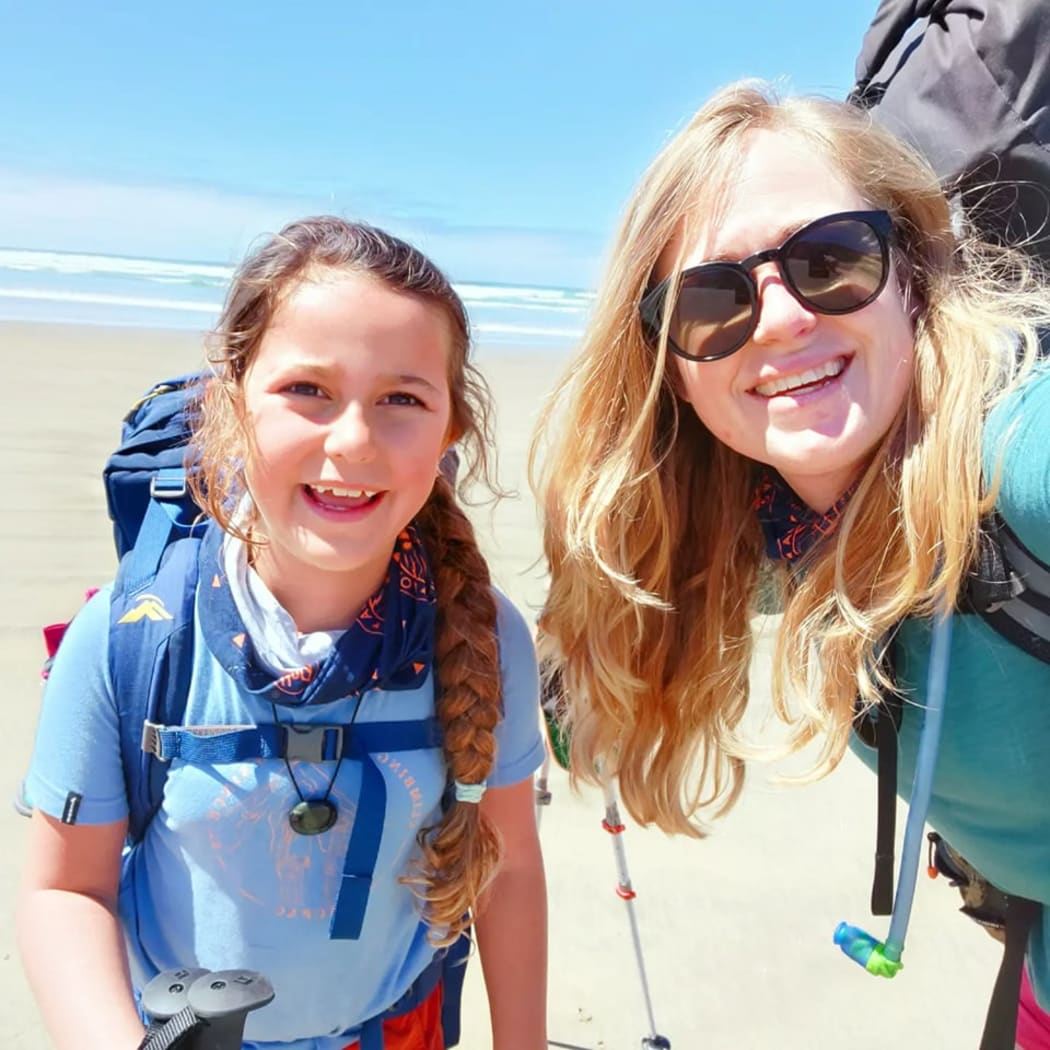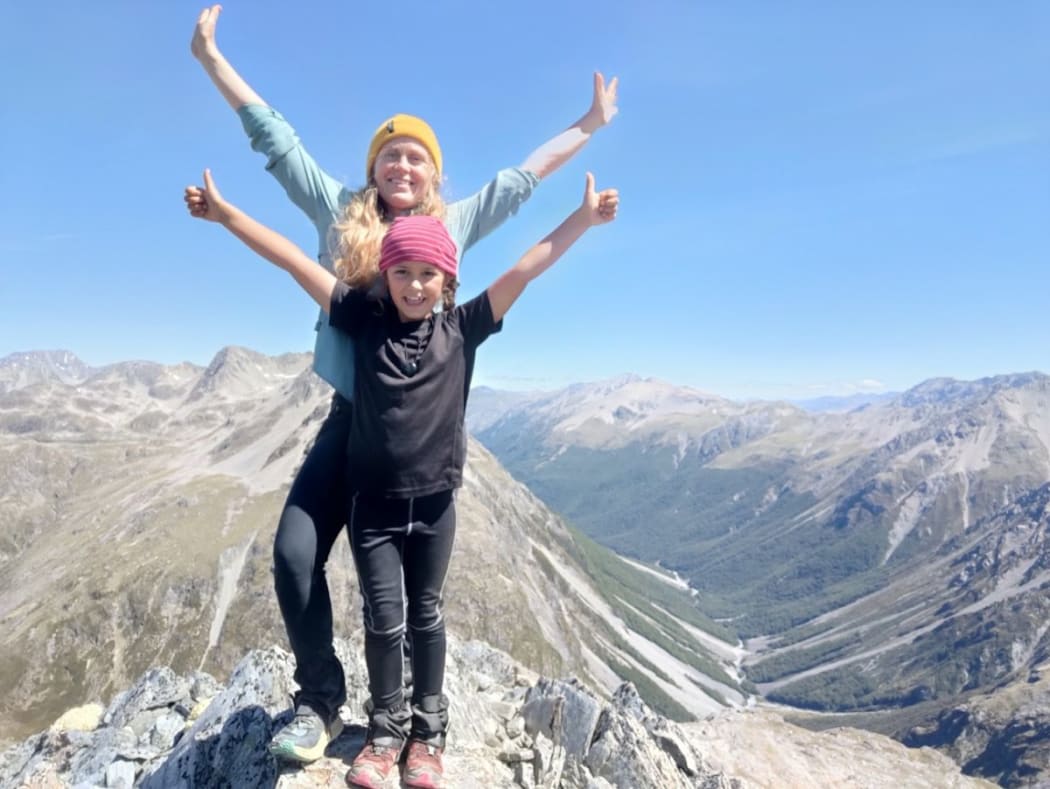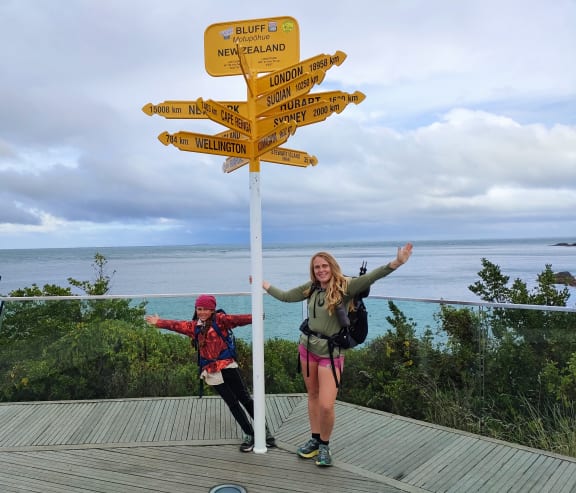Victoria and Emilie Bruce have just completed an epic hike down New Zealand, through wind, rain, hail and snow, but also, thankfully, sunshine.

Emilie (left) and Victoria Bruce. Photo: Supplied
Emilie is seven years old, Victoria is her mother, and together they have walked the best part of 3000km down the Te Araroa track from Cape Reinga to Bluff.
Trail organisers say as far as they know Victoria and Emilie are the first mother/daughter combination to have walked the track by themselves and it has taken them 138 days. They began in October last year.
Victoria was hoping for mental healing on the journey, and they have raised thousands of dollars for the Mental Health Foundation and Federated Mountain Clubs of New Zealand.
"I thought the best place to do that would be, you know to spend time doing something I love, which is tramping and spending time with my daughter and being out in nature."
Victoria said the trail is "like an evolution of the New Zealand landscape" and when you look back at a mountain you have just climbed there is a wonderful sense of achievement.
"I'm like a lot of trail walkers, we're not in it for the speed or the destination, for us a great day is, you know, maybe walking six hours and then finding a beautiful stream or a little piece of bush to set up camp in."

Photo: supplied
But Victoria said it was not all plain sailing and she made the mistake of swapping her hiking shoes for an e-bike on the way to Queenstown which led to an accident that caused her a minor concussion and a very sore calf.
She said the accident meant she was confined to bed for nearly a week which rocked her confidence.
Emilie had a tumble down a bank on a steep section of the Richmond Ranges and got stung by some wasps the next day, Victoria said.
"We've both had a few scraps and bruises and so on but sometimes the hardest part of a long stretch of trail walking is just the gradual discomfort, you know knowing that you're kind of soggy and damp and cold and you know all you really have to look forward to at the end of the day is to crawl inside your equally soggy tent and eat, yet again, some more dehydrated food."
Victoria said it can be a challenge to endure that physical discomfort and work out how "to turn that around so you can still find joy in those situations".
She said that even though they had a lot of support while doing the walk, there were times when they felt very alone.
"When you're out there in the hills you feel very alone and you're also very much with yourself and not everyone is comfortable spending long stretches of time by yourself and I think really there comes a point where it's no longer that great to be by yourself, you really do need somebody else to, yeah, just to distract you or help buoy your spirits."
But she said those days when you feel down pass like the weather and ultimately they made it.
Victoria said up until now much of her working life has been spent in an office, but the time off has helped her to reconsider things and maybe do things a little differently and spend more time outdoors.
Victoria has been diagnosed with post-traumatic stress disorder much of which she said stemmed from abuse during her time in state care.

Photo: Victoria
She said being out in nature helped her and allowed her to come to terms with a lot of things.
"We're a very task driven society and I think being out in nature without any of those distractions, it just gives you time to allow your mind to do what minds need to do, to unwind, to unpack, to process and having that time alone with yourself and your thoughts I guess helps you to redefine your narrative."
Victoria said she has had some memories return during the walk and even though it was unpleasant to experience those feelings at the time, it has been very cathartic.
She said it has been good for Emilie and great to see her confidence improve.
Every day would involve a discussion about where to set up camp and what to have for dinner and how to combine the food, Victoria said.
"Even on the trail she (Emilie) likes to be the leader, so you know when you're the leader it does come with responsibility, you have to let the person behind you know if there's a slippy patch, you've got to look out for those often obscure orange markers so that you don't suddenly go wandering off the trail."
Victoria said it is great because children are able to find a lot of joy in the small things.
"The beautiful wild places are out there but they are under attack," Victoria said.
She said as they got closer to people streams would become more polluted, weeds and rubbish would appear and damage from pests such as possums and stoats was also visible.
The pair has been fundraising for the Mental Health Foundation and Federated Mountain Clubs of New Zealand during the walk via a Give-a-little page which has so far exceeded $23,000.

